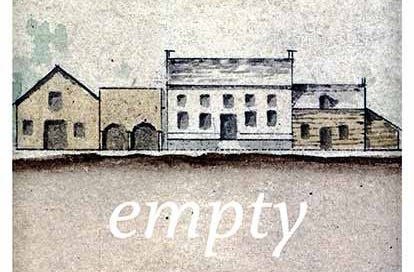Says the novelist and critic Henry James, “The globe is fast shrinking, for the imagination, to the size of an orange that can be played with; the hurry to and fro over its surface is that of ants when you turn up a stone …. The ancient local concentration that was so involuntary in Dickens and Balzac is less and less a matter of course; and the period is calculably near when successfully to emulate it will figure to the critical eye as a rare and possibly beautiful tour de force.” (Fortnightly Review, April 1898).
In A halt, which is empty, rob mclennan brings poetic voice to disparate, ultra-localized geographies of Canada. Using his characteristic mid-phrase comma as a pivot, he models the rhythms of walking and stopping, looking and proceeding.
Take, for example, this, from “Quarters: Calgary,” whose third section begins, “A Canadian city, is. This growing graveyard, family density. Sprawls, / a shattered cadence. …” If Henry James had written haiku, they might look like this—measured, elliptical, with vistas contained in the pauses.
mclennan, as stated in his bio, hails from “Ottawa, Canada’s glorious capital city,” whose neighbourhoods feature in poetic sequences devoted to Bytown, Stewarton, and “The particular and busy lives of side streets." The book’s geographies are arrayed not only in space but also through historical time, and along the axes of human relationships. One section is devoted to the War of 1812 (“We are sick of, interruptions. // Americans, Yankee, / go home. We said, // with force as neighbourly as possible.”) Other pieces are annotated as having been first “produced in an edition of one” for presentation to the author’s wife on the occasions of their marriage and first anniversary.
Structured as a series of twenty-three titled sections, each comprising a group of related poems, the book operates across scales and moves into the territory of “the long poem.” Each section is introduced by a quotation from another writer, allowing mclennan to engage in myriad dialogues with predecessors and contemporaries. “Foursquare,” for example, begins with a quotation from Concordia-based poet Stephanie Bolster, then signals affinities with Robert Kroetsch (1927-2011) through the use of “Field Notes” as a repeated heading. Then there’s a shout-out: “Lately, Robert Kroetsch has been on my mind again. A thin, clear, / unspecific line. Less the writing, more the man himself. Everywhere, I / see the dead. …”
“Poem beginning with a line by Pinder” offers another feat of intertextuality. The opening quote comes from Robert Duncan, signposting the author’s debt to that poet and his “A Poem Beginning with a Line by Pindar.” In mclennan’s version, though, the borrowed lines come from a 2011 chapbook by Toronto-based poet Sarah Pinder, not from the extant work of a Greek lyric poet working in the Thebes area circa 400 BCE.
Conversations, location shifts, and freedoms with form make this a playful collection that’s suited less to desk- or couch-based reading and more to coming along as a companion on one’s own wanders.
A halt, which is empty bears a 2019 copyright (though the acknowledgements date the work several years earlier, to 2011-2012). mclennan is an icon of productivity on the scale of Viper, so that’s like five or six books ago … it’s hard to keep count. One piece that’s especially poignant to read at this later date is “Lemonade, polydactyl (or, the cat with twenty-two toes,)”—those who follow mclennan’s blogging activities will know that Lemonade passed away recently. May his toes find purchase in the Great Beyond.
Publication Details
Author: rob mclennan
Title: A halt, which is empty
Publisher: Mansfield Press
Year: 2019




